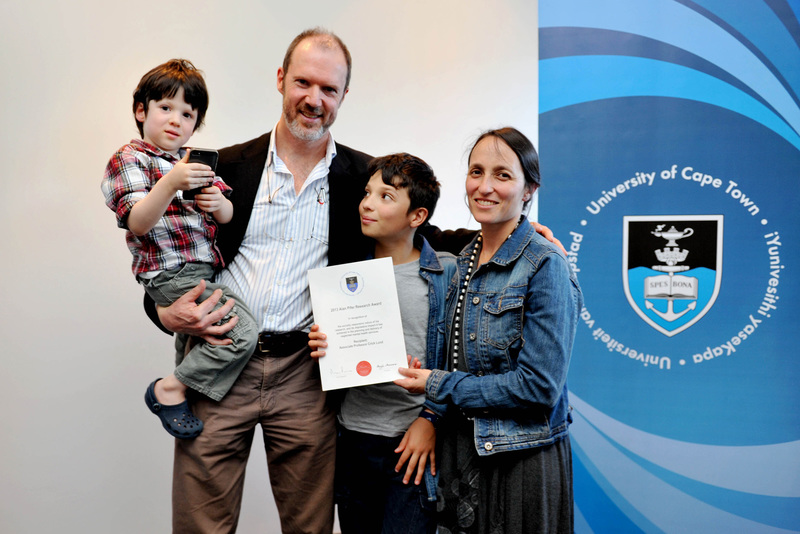Lund scoops Alan Pifer Award
14 March 2014 | Story Yusuf Omar. Photo Raymond Botha.
For the third time in nine years, UCT's prestigious Alan Pifer Award has been conferred on a researcher from the university's Department of Psychiatry and Mental Health.
The award is given annually by the Vice-Chancellor in recognition of outstanding socially responsive research.
Professor Crick Lund, director of the Alan J Flisher Centre for Public Mental Health, received the honour on 12 March 2014. Lund follows the late Flisher (2005) and Professor Dan Stein (2010) as recipients from that department.
Speaking at the award ceremony, Vice-Chancellor Dr Max Price said the university's ethos was one that upheld the importance of social justice and it was particularly concerned that its work had an impact on the world.
He added that the Pifer award played a role not only in in recognising and incentivising those who make a social impact, but also in valourising socially responsive research, making it visible and appreciated inside the university, not only amongst the communities UCT serves.
Lund was "deeply honoured and quite humbled just looking at the list of previous awardees".
"This is particularly important for me, not just personally, but also because it's an opportunity to draw attention to this neglected area of mental health," said Lund. "People who live with mental disorders are among, and continue to be among, the most poor, the most marginalised, the most disenfranchised members of our society, not just in South Africa but across the African continent."
Much of Lund's early research involved documenting the extent of mental health service provision in South Africa.
"My first job after qualifying as a clinical psychologist in 1996 was to work with Flisher on a project to develop norms and standards for mental health services," he said. "There we conducted the first post-apartheid situation analysis of mental health services in South Africa ... and out of that developed a set of norms for what the optimal models for delivery of mental health services are and how we can make use of the limited resources we have.
"We discovered, among other things, that there's approximately one psychiatrist for every 350 000 people in South Africa, and more or less the same for every psychologist."
Subsequent work in the Mental Health and Poverty Project, which was directed by Flisher, and for the World Health Organisation (WHO), told a grim story of the rest of Africa: "We found that there's one psychiatrist for every 2-million people in sub-Saharan Africa and one psychologist for every 2.5-million people. This gives a sense of the extent of the treatment gap. We know at least 75% of people living with mental disorders don't receive any form of evidence-based care."
Lund worked for the WHO from 2000 to 2005, trying to develop frameworks that could be applied and used in other lower-to-middle income countries.
"We developed a set of guidance materials to assist countries to develop national mental health policies and service plans and to budget appropriately for mental health care."
There is certainly hope on the policy front, reported Lund.
"In the last five years we've seen a real change in the way ministries of health are thinking about mental health, particularly in the case of South Africa, where, for the first time, we now have a mental health policy and action plan with clear targets between now and 2020.
"So it feels like the policy environment is changing, and this is particularly rewarding."
Lund thanked his colleagues, family and the university for supporting his work.
"As you know, research is a team sport; it's not [about] individuals. I'd really like to thank and acknowledge the work of the university in developing partnerships across the continent. The work that we're trying to do in the centre is very much aligned to that. I feel very proud to be part of a university that is committed to building academic excellence in, and for, Africa."
 This work is licensed under a Creative Commons Attribution-NoDerivatives 4.0 International License.
This work is licensed under a Creative Commons Attribution-NoDerivatives 4.0 International License.
Please view the republishing articles page for more information.










